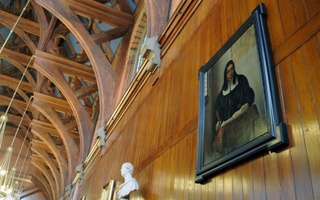The School of Engineering and Applied Sciences has further expanded its graduate program in Computational Science and Engineering, which now includes both a master of science degree and a master of engineering degree.
The one-year master of science degree was introduced in fall 2013, while the two-year, research-focused master of engineering degree began just this fall. Both degree programs are housed under the Institute for Applied Computational Science.
The CSE graduate program, which was first introduced in 2011 as a secondary field for doctoral students, was developed under the supervision of SEAS Dean Cherry A. Murray with the help of an external advisory committee.
According to Daniel S. Weinstock, assistant director of graduate studies in computational science and engineering, 29 students are enrolled in the CSE programs this year—nine more than the first cohort who graduated last May.
Weinstock said that the introduction of the degrees came as a response to the “real need” for computational skills in industry. Computer science and applied mathematics courses make up the core curriculum of the two new degree programs.
“The master of science students that graduated last year were very successful in finding jobs,” he said, adding that CSE teaches degree candidates to apply methods from computer science to a wide variety of disciplines.
“I think this whole effort and enterprise is aimed at helping students understand how useful computation can be in today’s scientific environment but even in a broader sense how important computation is for doing all sorts of interesting things in the real world,” said physics professor Efthimios Kaxiras, founding director of the Institute for Applied Computational Science.
Kaxiras also said that SEAS is now considering offering a secondary field in CSE to undergraduate students as well.
“There is a lot of interest among undergraduates,” he said, adding that several of them have enrolled in CSE courses and others have jointly completed a bachelor degree and a master degree in CSE.
“Some people refer to [computation] as the third leg of science, the other two being theory and experiments,” he said, adding that the discipline is essential to a number of scientific fields.
According to Catherine A. Chute, executive director of the Institute for Applied and Computational Science, the CSE program is one of the ways in which Harvard is promoting twenty-first-century skills and knowledge.
“It’s a very interesting and exciting part of what Harvard is trying to do both out in the world and for its students,” she said.
—Staff writer Francesca Annicchiarico can be reached at francesca.annicchiarico@thecrimson.com. Follow her on Twitter @FRAnnicchiarico.
Read more in University News
Rogers Defends Management Co. Compensation in Letter to AlumniRecommended Articles
-
 Braun Falsely Claims Harvard Degrees
Braun Falsely Claims Harvard Degrees -
 Wampanoag To Be Honored With Degree
Wampanoag To Be Honored With Degree -
Report Identifies Most Lucrative College MajorsFor students who may be less sure of their academic paths, a study published Tuesday raises questions about the financial implications of choosing one concentration over another.
-
Faust Confers 9 Honorary DegreesCommencement speaker and Liberian President Ellen Johnson Sirleaf was among nine recipients of honorary degrees at the morning exercises of the Commencement ceremony Thursday.
-
 Is College Worth the Money?
Is College Worth the Money? -
At 362nd Commencement, 7,321 Are Awarded DegreesA total of 1,651 Harvard College seniors became graduates Thursday morning as University President Drew G. Faust conferred degrees on the Class of 2013 at the University’s 362nd Commencement exercises in Tercentenary Theatre.













